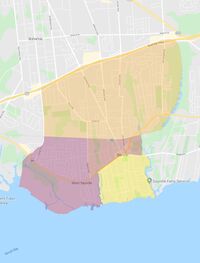Kingdom of West Sayville
This article needs to be updated. |
Kingdom of West Sayville Royaume de l'Ouest de Sayville | |
|---|---|
 West Sayville highlighted in Purple | |
| Official languages | |
| Government | Parliamentary Constitutional Monarchy |
• Monarch | Tom I |
| Sertor Valentinus | |
| Legislature | Council of Ministers |
| Establishment | |
• Regional founding | 26 December 2018 |
| Area | |
• Total | 5.45 km2 (2.10 sq mi) |
• Water (%) | 0.31 |
| Population | |
• 2022 estimate | 14 |
| Time zone | UTC-5 (EST) |
| GUM 3-letter code | WSV |
| Microcode | WS |
Website Official website | |
The Kingdom of West Sayville (French: Royaume de l'Ouest de Sayville), commonly known as West Sayville, is a micronation located in Suffolk County, New York. West Sayville includes the hamlet of West Sayville in its entirety, and borders the Empire of Sayville, the Kingdom of Powhatan and the Kingdom of Sayville. The total area of West Sayville is 2.10 square miles (5.45 km2).
West Sayville is a constitutional monarchy. The monarch, King Tom I has reigned since 2019. West Sayville is compromised of five subdivisions: La Salle, Brookside-Fremont, Berard-Malloy, Greene's Creek and Green Point. West Sayville is also organised into three ceremonial Dukedoms: La Salle, Brookside and Bartley.
The Kingdom of West Sayville originated from a NationStates community, founded initially as a client state of the Kingdom of Sayville. Six months following its founding, West Sayville gradually withdrew from the website and followed the direction of the Commonwealth of Sayvillian Regions into becoming a solely micronational entity.
West Sayville is a member of the Commonwealth of Sayvillian Regions, the Cupertino Alliance and the Grand Unified Micronational.
Etymology
The Kingdom of West Sayville is named after the hamlet of West Sayville. West Sayville takes its name from the neighbouring hamlet of Sayville, which acquired its name following a misspelling of "Seaville" in 1838.[1]
History
Pre-Nationhood
The whole of Long Island was uninhabited until around 11,000 years ago due to an extended glacial period blanketing northeast America in thick ice sheets.
Before 1000 AD, Native Americans from Rhode Island and Connecticut migrated to Long Island, which they named Paumanak. The area stretching from the south shore of Islip to the centre of the island was inhabited by the Secatogue Tribe, who's algonquain name meant 'Black or Dark Lands'. They mainly lived in settlements near the shores, where they collected fish and clams for food.[2][3][4]
In 1620, the area came under jurisdiction of the Plymouth Company, then known as the Plymouth Council for New England. English settlers attempting to settle the Plymouth Colony were however warned off by the governor of New Netherland. This situation was resolved in 1650 by the Treaty of Hartford, dividing the island between the English and Dutch. Some of these Dutch settlers form what became a sizeable Dutch community in what is now West Sayville.[5]
In 1692, Thomas and Richard Wilchetts bought part of the area where Islip now lies from the local Secatogues. The town itself was established in 1710, comprised mostly of English settlers, having no more than 31 freeholders within ten years. The first major battle of the American War of Independence was fought on the island in 1776, with many local men from the Islip area partaking in the battle.[3]
Later on in 1785, the Edwards Homestead was built in the area that is now Sayville, with more families moving in by the early 1800s. In 1838 the postal service asked the village to come up with a name, eventually resulting in 'Sayville' following a spelling mistake by a clerk.[1][6]
Later on, an unnamed unincorporated community was given the name 'West Sayville'. It was originally intended to be named 'Greeneville' after John Greene, a settlers who was responsible for much of the areas architecture and urban planning.[5]
Early History
Origins
The Kingdom of West Sayville was founded on the 26th of December 2018 as an online community focused around the hamlet of West Sayville. Initially, West Sayville was a client state of the Kingdom of Sayville despite no official codifying of such an agreement. Said vassalage was considered dissolved upon the crowning of the first King of the West Sayvillians.[7]
Shortly after its independence, West Sayville joined the Commonwealth of Sayvillian Regions on the 7th of January 2019.[8]
Formation

Founder of the Kingdom of West Sayville
On the 18th of July 2019, the Sayvillian community leaders decided to venture into the field of micronationalism, a transition virtually completed by the 3rd of November 2019.
During this period, West Sayville signed its first official inter-micronational treaty with the Principality of New Eiffel, establishing mutual recognition.[9]
Modern History
Following a political crisis, the King of the West Sayvillians abdicated the throne on the 28th of December. King Tom I was subsequently crowned 2 days later.[7]
On the 7th of June 2020, the Council of West Sayville passed the Flags and National Symbols Act, retiring the old yellow and purple tricolour, and establishing a new unique burgundy and yellow flag.[10]
Later on in the summer, the Crown Prince Scansinia was appointed as regent, due to the King facing health complications.[11]
Early on in October, local activist Vincent Vertuccio held a pan-sayvillian round table meeting attended by many delegates from the Sayville Sector and the Long Island Micronational Area including the West Sayvillian delegation. Issues pertaining to the Sayvillian community such as demographics, politics and history were discussed.[5] During the same month, the nation was accepted as an observer state within the Cupertino Alliance and the Grand Unified Micronational, providing a boon to the nations prestige.[12]
Geography
The Kingdom of West Sayville encompasses the hamlet of West Sayville, located within Islip. The nation possesses a coastline which borders the Great South Bay, a lagoon possibly formed by a catastrophic event 2200 years ago[13]
The territory of West Sayville spans 5.45 km2; 0.31% of this is comprised of water.[14]
Climate
| Climate data for Islip, New York (Long Island MacArthur Airport), 1981–2010 normals,[a] extremes 1963–present | |||||||||||||
|---|---|---|---|---|---|---|---|---|---|---|---|---|---|
| Month | Jan | Feb | Mar | Apr | May | Jun | Jul | Aug | Sep | Oct | Nov | Dec | Year |
| Record high °F (°C) | 69 (20.6) |
68 (20) |
82 (27.8) |
94 (34.4) |
98 (36.7) |
96 (35.6) |
104 (40) |
100 (37.8) |
94 (34.4) |
89 (31.7) |
78 (25.6) |
77 (25) |
104 (40) |
| Average high °F (°C) | 38.0 (3.33) |
40.3 (4.61) |
47.3 (8.5) |
57.6 (14.22) |
67.5 (19.72) |
76.6 (24.78) |
81.7 (27.61) |
80.4 (26.89) |
73.8 (23.22) |
63.0 (17.22) |
53.2 (11.78) |
43.0 (6.11) |
60.3 (15.72) |
| Average low °F (°C) | 23.3 (-4.83) |
25.2 (-3.78) |
31.3 (-0.39) |
40.6 (4.78) |
49.8 (9.89) |
60.2 (15.67) |
66.0 (18.89) |
65.3 (18.5) |
57.5 (14.17) |
45.5 (7.5) |
37.1 (2.83) |
28.2 (-2.11) |
44.3 (6.83) |
| Record low °F (°C) | −8 (-22.2) |
−14 (-25.6) |
0 (-17.8) |
16 (-8.9) |
32 (0) |
42 (5.6) |
49 (9.4) |
45 (7.2) |
38 (3.3) |
23 (-5) |
11 (-11.7) |
−1 (-18.3) |
−14 (−25.6) |
| Average Precipitation inches (mm) | 3.64 (92.5) |
3.26 (82.8) |
4.44 (112.8) |
4.34 (110.2) |
3.78 (96) |
4.27 (108.5) |
3.43 (87.1) |
3.98 (101.1) |
3.58 (90.9) |
3.79 (96.3) |
3.67 (93.2) |
4.06 (103.1) |
46.24 (1,174.5) |
| Average Snowfall inches (cm) | 6.7 (17) |
7.1 (18) |
4.5 (11.4) |
0.6 (1.5) |
0 (0) |
0 (0) |
0 (0) |
0 (0) |
0 (0) |
0 (0) |
0.5 (1.3) |
5.4 (13.7) |
24.8 (63) |
| Average precipitation days (≥ 0.01 in) | 11.0 | 9.1 | 10.5 | 11.3 | 11.1 | 10.1 | 9.1 | 8.5 | 8.6 | 8.5 | 10.3 | 10.8 | 118.9 |
| Average snowy days (≥ 0.1 in) | 3.7 | 3.4 | 2.3 | 0.3 | 0 | 0 | 0 | 0 | 0 | 0 | 0.2 | 2.4 | 12.3 |
| Source: NOAA[15][16] | |||||||||||||
Government and Politics
King of the West Sayvillians since 2019
West Sayville is a constitutional monarchy headed by The King of the West Sayvillians.[17] The legislature consists of a council of ministers, headed by a Prime Minister.[18]
The incumbent monarch and Head of State is King Tom I. They are seconded in the line of succession by Crown Prince Scansinia.[17]
The current Head of Government is Prime Minister Sertor Valentinus, who was elected on the 13th of May[citation needed].
Governance
- See also: Prime Minister of West Sayville
The Council of Ministers is the de facto legislature of West Sayville. It is comprised of all Ministers appointed by the Prime Ministers, with the exact composition and numbers determined by the holding Prime Minister.
The Prime Minister themselves are the Head of Government. They are tasked with overseeing the government and appointed ministers to the council.[18]
| Image | Name | Position |
|---|---|---|
| Sertor Valentinus | Prime Minister[citation needed] | |
 |
Sekhmet | Minister[citation needed] |
 |
Palractus | Minister[citation needed] |
 |
HM Tom I | Minister HM The King[citation needed] |
Foreign Relations of West Sayville
West Sayville possesses relations with several other micronations within the Commonwealth of Sayvillian Regions, and by extension the Sayville Sector. West Sayville signed its first treaty of mutual recognition with the Principality of New Eiffel in a deal also including the other CSR member states.[9]
In Summer 2020, the West Sayvillians planned on establishing ties with the Ausverian Volksrepublik, though later rescinded their signature to bilateral treaty following concerns regarding far-right tendencies.[11][19]
West Sayville ratified the La Salle Convention, an international convention designed to tackle the growing threat of disruptive and destructive cyber-activity within micronationalism.[20]
Prime Minister Sertor Valentinus informed the Sayvillian Broadcasting Corporation that he would like to see West Sayville acquire membership within the Cupertino Alliance, and become at the very least an observer state of the Grand Unified Micronational.[11] West Sayville was partially successful in this endeavour, having been inducted as an observer state to the Cupertino Alliance and the GUM in October 2020.[12][21]
Formal relations and treaties signed
 Principality of New Eiffel[9]
Principality of New Eiffel[9] Kingdom of Sayville
Kingdom of Sayville Empire of Sayville[22]
Empire of Sayville[22] Commonwealth of Naveria[23]
Commonwealth of Naveria[23] Unified Royal States of Australis[24]
Unified Royal States of Australis[24] Misberian Confederacy[25]
Misberian Confederacy[25]
Informal Relations
 Cupertino Alliance Member States
Cupertino Alliance Member States Kingdom of Pinelandia
Kingdom of Pinelandia Dominion of Sayville
Dominion of Sayville
Population
Language
As a participant in the Pan-Sayvillian Commission on the French Language, an independent government agency operating in the Commonwealth of Sayvillian Regions, the French language is promoted and standardised within West Sayville.
Speakers of French are referred to as 'Franco-Sayvillians'.[26]
Infrastructure
Transportation
The Minister of Transport is responsible for the implementation of the Pan-Sayvillian Manual of Traffic Control Devices, a comprehensive standard of universal road sign standards within the Commonwealth of Sayvillian Regions.[27]
Culture
Values
Several uncodified values play a large part in the culture of West Sayville. Such values include support for a Pan-Sayvillian identity, French and English bilingualism, a commitment to peace, egalitarianism, democracy, and acceptance and tolerance.[28]
National Symbols
West Sayville has three legally established symbols, such being a national flag, a coat of arms and a national animal.[10]
The national Animal of West Sayville is the Honduran White Bat, a small white furred bat found in East Mesoamerica.[10] Despite its status as the West Sayvillian national animal, the species does not exist in the United States.[29] The bat is classified as a near threatened species on the IUCN Red List.[30]
Despite no extant records remaining of its establishment, West Sayville formerly used a tricolour displaying the pan-sayvillian colours fronted with a blue naval crest as the national flag. Following the passage of the Flags and National Symbols Act, a new yellow and burgundy flag was officially established, displaying the national crest.[10]
-
2018 - 2020
-
2020 - present
Royal House
The Royal House of West Sayville is comprised of all individuals in the line of succession to the throne, including the Dukes of Brookside, La Salle, and Bartley.
The King of the West Sayvillians is considered to be the Head of the Royal House until they either death or abdication. They are also vested with the power of granting royal titles.[17]
| Image | Name | Title |
|---|---|---|
 |
HM Tom I | King of the West Sayvillians |
 |
HRH Scansinia I | Crown Prince |
See also
Footnotes
- ↑ Mean monthly maxima and minima (i.e. the expected highest and lowest temperature readings at any point during the year or given month) calculated based on data at said location from 1981 to 2010.
References
- ↑ 1.0 1.1 Dickerson, Charles. A History of the Sayville Community. Sayville, NY: Sayville Historical Society. p. 20.
- ↑ The Thirteen Tribes of Long Island, The History Files
- ↑ 3.0 3.1 First History of West Islip (PDF), Gerald and Judith Wilcox.
- ↑ The Tribes of Long Island, JeremyNative.
- ↑ 5.0 5.1 5.2 Valentinus, Sertor (4 October 2020) Local activist leads Sayville round table. Brookside Gazette.
- ↑ The Early Years: Sayville's Founding Fathers, Patch.
- ↑ 7.0 7.1 Early History of West Sayville
- ↑ Members of the Commonwealth | Membres du Commonwealth
- ↑ 9.0 9.1 9.2 Treaty of Mutual Recognition Between the Principality of New Eiffel, the Kingdom of Sayville, the Kingdom of West Sayville, and the Empire of Sayville. 2019.
- ↑ 10.0 10.1 10.2 10.3 Cite error: Invalid
<ref>tag; no text was provided for refs namedflag - ↑ 11.0 11.1 11.2 Burgardt, Charles (18 September 2020) The Summer in Review. Sayvillian Broadcasting Corporation (SBC).
- ↑ 12.0 12.1 Valentinus, Sertor (14 October 2020) West Sayville granted GUM “observer state” status. Brookside Gazette.
- ↑ History of the Great South Bay estuary: Evidence for a catastrophic origin, State University of New York (SUNY.com)
- ↑ Geographic Identifiers: 2010 Demographic Profile Data (G001): West Sayville CDP, New York, U.S. Census Bureau, American Factfinder
- ↑ "NowData - NOAA Online Weather Data". National Oceanic and Atmospheric Administration. Retrieved 2020-07-22.
- ↑ "Station Name: NY ISLIP LI MACARTHUR AP". National Oceanic and Atmospheric Administration. Retrieved 2015-02-26.
- ↑ 17.0 17.1 17.2 Royal House of the Kingdom of West Sayville
- ↑ 18.0 18.1 Cite error: Invalid
<ref>tag; no text was provided for refs namedbasic - ↑ Fredrick M. AGREEMENT BETWEEN THE Commonwealth of Sayvillian Regions AND Ausveria THEIR MUTUAL RECOGNITION AGREEMENT, 2020.
- ↑ West Sayville ratifies La Salle Convention. Brookside Gazette. 2020.
- ↑ Sriraya, Varuna (11 October 2020) Week at a glance. Purvanchal Times.
- ↑ Treaty of the Sayvilles, CSR. 2020.
- ↑ Treaty of Mutual Recognition between West Sayville and Naveria.
- ↑ Treaty of Mutual Recognition between West Sayville and Australis.
- ↑ Mutual Recognition Between the Misberian Confederacy and Kingdom of West Sayville. Retrieved 30 October 2020.
- ↑ Pan-Sayvillian Commission on the French Language, Commonwealth of Sayvillian Regions. Retrieved 19 November 2020.
- ↑ Pan-Sayvillian Manual on Uniform Traffic Control Devices, Commonwealth of Sayvillian Regions. Retrieved 19 November 2020.
- ↑ Hawthorne, Isaiah (24 September 2020) West Sayville Remarks. Cupertino Alliance.
- ↑ Ectophylla alba white bat, Animal Diversity Web.
- ↑ Rodriguez, B. and Pineda, W. 2015. Ectophylla alba. The IUCN Red List of Threatened Species 2015: e.T7030A22027138.




